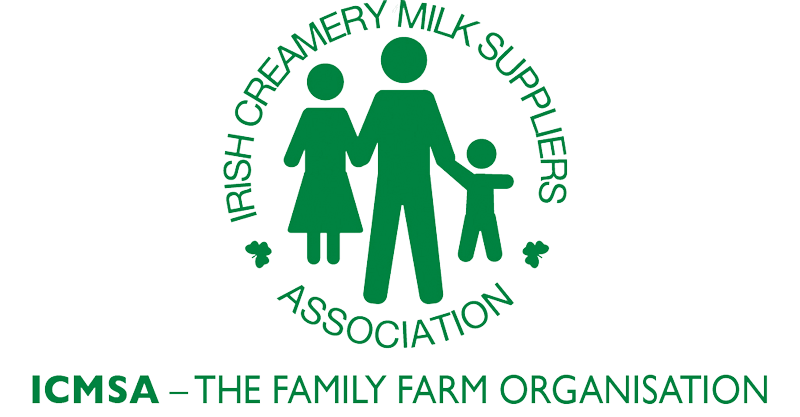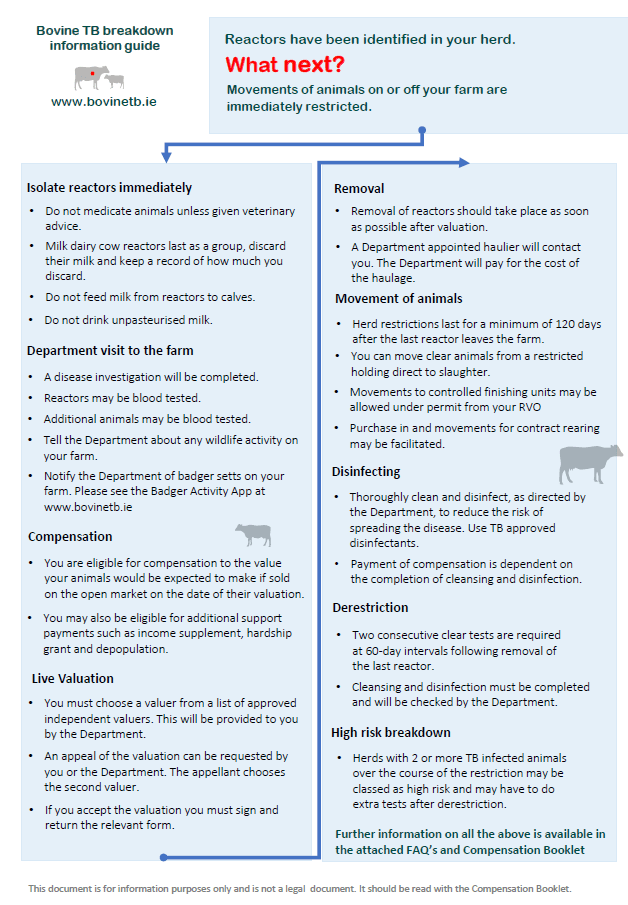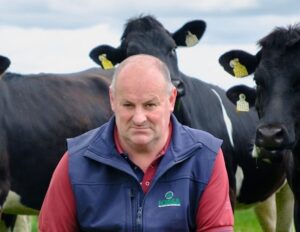
Bovine Tuberculosis (TB)
What is Bovine TB?

Bovine Tuberculosis
Bovine Tuberculosis is a chronic, highly infectious disease of cattle caused by Mycobacterium bovis. The bacterium can cause disease in other domestic or wild animals and also in humans. Please check out the Frequently Asked Questions (FAQs) document below for any questions a farmer may have on TB
The Flowchart below has been designed in coordination with the Department of Agriculture, Food and the Marine to assist a farmer if you have just had a TB reactor on your farm. If you have additional queries please contact ICMSA Head Office.
Causes of infection in cattle
-
Breathing air contaminated by already infected animals;
-
Consuming contaminated food or water;
-
Movement of animals and contact with infected animals e.g. across fences;
-
Inter-farm sharing of machinery (cattle trailers, muck/slurry spreaders, etc.) or farm facilities (cattle crushes);
-
The use of dirty lorries to transport animals;
-
Wildlife, especially badgers, infected with Mycobacterium Bovis may be a significant factor in the persistence of bovine tuberculosis in certain areas.
Precautions against TB Infection
-
Have stock-proof boundary fencing;
-
Avoid contact with other herds and stock of unknown status;
-
Exercise care in buying-in cattle. Ensure that only recently tested cattle are allowed onto your farm to mix with your stock;
-
Avoid using dirty contract equipment e.g. cattle transport, slurry spreaders. All such equipment should be cleansed and disinfected before use.
The risk of spread from wildlife can be reduced by keeping cattle and infected wildlife apart and by implementing the following measures:
-
Fencing off common watercourses, stagnant ponds, badger setts and badger toilet areas;
-
Raising drinking and feeding troughs to over 84 cm (32 inches) in height and locating them away from walls/ditches to prevent access;
-
Not providing hand feeding to cattle where deer can share it e.g. circular feeders and/or meal troughs;
-
Keeping feed storage areas, cattle sheds and yards closed so that wildlife cannot gain entry;
-
Checking fields regularly for badger carcasses and especially before moving cattle onto new pasture.
-
Being aware of unusual sightings of badgers e.g. in daytime. The badgers may be sick from TB - contact your District Veterinary Office.
The ideal long-term answer to the problem of bovine tuberculosis is eradication. With an appropriate co-ordinated approach, together with new technology currently being developed, Ireland can advance towards eradication of Bovine TB.
Testing Arrangements
Annual "Round" screening test
- It is a legal requirement that cattle over 6 weeks of age have had a TB test within the previous 12 months before moving out of a holding. Therefore all herds must be tested at least once every 12 months. The Department issues schedules of herd tests to private veterinary practitioners in phases throughout the year. Farmers, under cost-sharing agreements, pay the private veterinary practitioners directly to carry out one test per annum. Reminders are sent out as appropriate to ensure testing is carried out on the prescribed dates. Where necessary, holdings are restricted for non-compliance with the instruction to test under the Round test regime.
Wildlife strategy
-
In the short term, the contribution of infected badgers to the spread of disease in bovines continues to be quantified and analysed. In this regard, the Department is continuing to operate various badger based research projects,
-
In the medium term, badger population control/reduction is focussed on the higher risk-areas of the country where disease is clustered and is subject to detailed epidemiological investigation determining that bovine sources are unlikely,
-
In the medium term also, work is progressing on a project, the objective of which is to develop a vaccine for use in badgers that would lead to a reduction in the level of infection in that species, thereby reducing the number of organisms being shed and subsequently the level of transmission to the cattle population.
Export pre-movement test
- There is a mandatory 30-day pre-movement TB test on animals exported, there can only be one movement per cert.
Consequential testing
- Other tests for TB include reactor re-test, factory lesion re-test, post de-restriction (status-restoration) test, contiguous test, new herd tests.
TB Statistics
-
Latest TB results can be found here
Latest Headlines
- Sections
Contact Us
Telephone
+353 (0)61 314677






